After the death some years ago of Captain Henry Singer, David Singer, his
son, discovered “a great many papers” from his dad’s service in WWII.
“Everything from pay and travel vouchers to commendations were stashed in a
leather folder.” Trying as best as he could to piece together a chronology
of his dad’s service, David began sending some of the information along to
us, along with his own recollections of the few stories his dad told him of
his time as an Army Signal Officer.
A graduate of Class 42-06, Captain Henry Singer ended up being deeply
involved in, among other things, the North African campaigns. Some of the
stories and pictures follow. Over time David will continue to research the
papers in his dad’s files and send along more information to help capture
the legacy of this member of America’s greatest generation. As we receive
new information on Captain Singer we will add it to this archive. check back
from time to time, and enjoy reading what it was like to be an Army Signal
Corps OCS graduate and Officer during WWII. As an aside, as David told us,
"Interestingly enough, I joined the 110th Signal Company (Heavy
Construction), OARNG in December of 1966.” It looks like Army Signal runs
long and deep in the Singer family. Hooah!

 Candidate
Henry Singer, Army Signal OCS Class 06-1942
Candidate
Henry Singer, Army Signal OCS Class 06-1942
eMail received
at ArmySignalOCS.com
5-09-2012
Captain Henry Singer a Military
Chronology
Sept. 1940 – Oct. 1945
1940
Sept. 14, 1940
Enlisted, Oregon National Guard, Assigned to HQ Co. 249th Coast
Artillery
1941
March 13, 1941
Promoted Staff Sergeant
March 22, 1941
Coast Artillery Electrical Course, Ft. Monroe VA, 12 wks.
1942
March 28,
1942 Transferred
to Signal Officers Candidate School, Ft. Dix NJ
April
17, 1942 Begin classes
SOCS, Ft. Monmouth NJ
July
13, 1942
Commissioned
2nd Lt., Ft. Monmouth NJ
Aug.
29, 1942 Assigned 829th Signal Services
Battalion
Oct.
14, 1942 829th Signal
Service
Battalion,
ordered to Staten Island, Port of NY
Promoted 1st
Lt
Oct.
22, 1942 Convoy loading, Western Task Force
Oct
24, 1942 Western Task Force Sails from Port of NY
Nov
8, 1942 Operation Torch commences. Lt. Singer lands with the 30th
Infantry Regiment at
Fedala, French Morocco
Dec.
25,1942 Released from
30th Infantry Regiment,
attached to the 71st Signal Co., Casablanca, FM
1943
Feb.
3, 1943 Transferred from 829 Signal
Service
Battalion
to Signal Section, Atlantic Base Section, Casablanca, French
Morocco
Apr.
16, 1943 TDY, 2623rd Signal
Service
Regiment,
Algiers, Algeria
July
? 1943 2623rd
Signal
Service
Regiment
redeployed to Casablanca, FM
Aug.
20, 1943 Assigned 6661st Signal
Service
Company
Nov.
12, 1943 Transferred
from 6661st Signal
Service
Company
to 976th Signal
Service
Company
Nov.
16, 1943 TDY Marrakech,
FM
1944
Jan.
10, 1944 TDY 5 days Marrakech,
FM, Designated Signal Officer “Casino”
Jan.
12, 1944 Churchill & de Gaulle
meet, Marrakech,
FM
Jan.
27, 1944 Assumes command 976th Signal Service Company
Jan.
29, 1944 Ordered proceed Casablanca, FM to Corsica
May
15, 1944 Assets for Operation “Dragoon-Anvil”
transferred to
Corsica
June
27, 1944 Promoted
Captain
Aug.
15 – 28, 1944 Operation “Dragoon-Anvil” takes place
Sept.
9 – 13, 1944 U.S. Army Rest Center, Rome, Italy
Nov.
30 – Dec. 8, 1944 Rotated to the United States, Furlough
Dec.
28, 1944 Reported to
Ft. Lewis,
WA, Reception Sta. #13
1945
Jan.
23, 1945 Reported to
Santa Barbara, CA,
Redistribution Station
Feb.
20-28, 1945 TDY Waco AAF, Waco, Texas
Mar.
6, 1945 TDY The Pentagon, Washington DC
Apr.
9-10, 1945 TDY The War College, Washington DC
Apr.
21, 1945 TDY New York City, NY
Apr.
25, 1945 Proceed to Fort Knox, then Fort Benning
May
14, 1945 Assigned to
9463 TSU-Sig C, Radio Propagation Unit, Holabird Signal Depot, Baltimore, MD
May
21, 1945 TDY Fort Knox, KY
Jun.
21, 1945 TDY The Pentagon
Jul.
31, 1945 TDY Fort Knox, KY 30 days
Sept.
14, 1945 Assigned Personnel Officer, Radio Propagation Unit
Sept.
18, 1945 Requested
release from active duty
Oct.
4, 1945 Released from Holabird Signal Depot for travel to Portland,
OR
Oct. 29, 1945 Released from
active duty

 Candidate
Henry Singer, Army Signal OCS Class 06-1942
Candidate
Henry Singer, Army Signal OCS Class 06-1942
eMail received
at ArmySignalOCS.com
5-10-2012
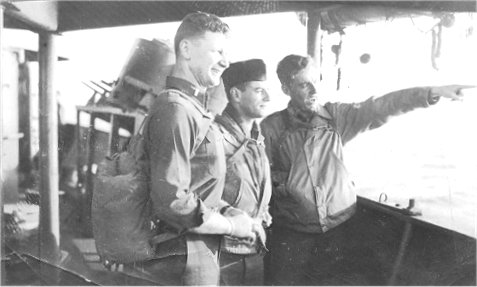 Comments
from David Singer, son of Captain Henry Singer: “Typical of his generation,
dad came home, put away his uniform and made a life for himself. He did have
a few stories to tell. As briefly as possible, I'll relate two of them.
Comments
from David Singer, son of Captain Henry Singer: “Typical of his generation,
dad came home, put away his uniform and made a life for himself. He did have
a few stories to tell. As briefly as possible, I'll relate two of them.
“After the successful allied landings in North Africa, a location was needed
for the overseas radio sets. It seems the Shell Oil Headquarters in
Casablanca was the tallest building in the city and the Signal Services
Battalion took over the top floor. My dad was a lifelong neck tie hater and
would avoid wearing one whenever possible. One day as he was coming down the
steps of the Shell building, sans neck tie, he passed General Patton and his
entourage going up. Patton stopped, walked over to my father, tapped him on
the chest with his swagger stick and said to one of his aides, "no neck tie
$50 fine." As Patton proceeded on his way, his aide merely shook his head
no, and followed after his boss.
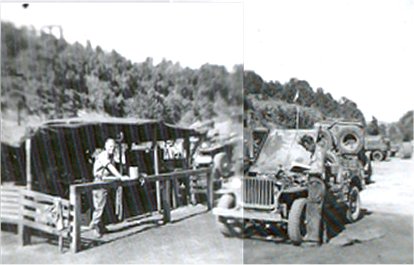 “When
dad was given his own command of a signal company they were shipped out to
Corsica to support the Allied landings in Southern France. Everyone was
bored out of their mind waiting for the invasion to take place. In what my
dad assured me was his "greatest contribution to the war effort," he took it
upon himself to organize a softball league on the island. After weeks of
preliminary play it came down to a climactic game between my dad’s team and
an engineering outfit from Texas. Naturally, his team won, with a lot of
money bet on the game. I have the autographed team ball. The game was
written up in Stars and Stripes. Regretfully, I do not have a copy. If [any
of your readers has] the ability to search the Stars and Stripes archive,
perhaps they could find that story on the ball game [and send along a copy].
I know it's out there because someone showed me a copy at my dad’s memorial
service. He was a well known athlete both before and after the war, in the
Willamette Valley area of Oregon.
“When
dad was given his own command of a signal company they were shipped out to
Corsica to support the Allied landings in Southern France. Everyone was
bored out of their mind waiting for the invasion to take place. In what my
dad assured me was his "greatest contribution to the war effort," he took it
upon himself to organize a softball league on the island. After weeks of
preliminary play it came down to a climactic game between my dad’s team and
an engineering outfit from Texas. Naturally, his team won, with a lot of
money bet on the game. I have the autographed team ball. The game was
written up in Stars and Stripes. Regretfully, I do not have a copy. If [any
of your readers has] the ability to search the Stars and Stripes archive,
perhaps they could find that story on the ball game [and send along a copy].
I know it's out there because someone showed me a copy at my dad’s memorial
service. He was a well known athlete both before and after the war, in the
Willamette Valley area of Oregon.
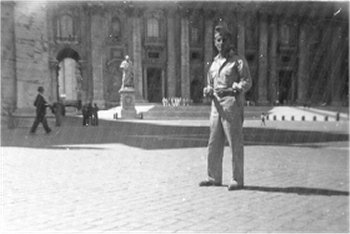 “I
have attached some pictures I hope you will find useful.
“I
have attached some pictures I hope you will find useful.
“The first [aboard ship] was taken on the way to N. Africa. The man in the
center is my father
“The second, Corsica HQ, shows the headquarters tent of my dad’s unit on
Corsica. He is the one stripped to his waist. I believe he was probably
installing a radio in the jeep. The man standing on the "porch" may be his
First Sergeant. I know they had a good relationship and kept in touch for
years after the war. Dad always said he would trade two officers for one
good NCO any day of the week !
“The third [shows] my dad on R&R in Rome late in the war. It appears to be
St. Peters Square.”

 Candidate
Henry Singer, Army Signal OCS Class 06-1942
Candidate
Henry Singer, Army Signal OCS Class 06-1942
Additional eMail comments received
at ArmySignalOCS.com
5-10-2012
"Another thing my dad was very proud of was the Soldiers Medal one of his
men received. During the landings at Fedala, an infantryman fell into a hole
and quickly went under in the surf. An enlisted man from dad’s detachment
stripped off his field gear and went into the water, saving the man from
drowning.
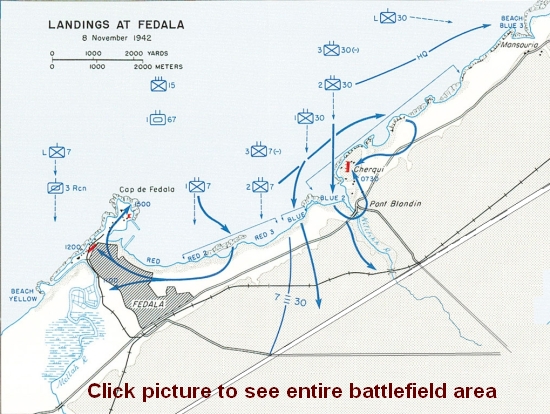 [Editor’s
Note: Captain Henry Singer and his unit participated in the landing at
Fadala, on the coast of Morocco. A classic amphibious assault put on by the
3rd Division, it was part of the French Moroccan Campaign. While the
campaign itself turned out successful, resistance at the fishing village of
Fedala, 15 miles east of Casablanca, was incredibly strong. As the first
attack wave landed just before dawn some troops were put ashore as much as
two to three miles away from their designated beaches. Others landed on
rocks and in heavy surf. Lives were saved by Kapok jackets after landing
craft capsized or were grounded in the surf. The beach was intermittently
covered by French coastal searchlights, artillery and machine gun fire as
well as by airplane bombing and strafing.
[Editor’s
Note: Captain Henry Singer and his unit participated in the landing at
Fadala, on the coast of Morocco. A classic amphibious assault put on by the
3rd Division, it was part of the French Moroccan Campaign. While the
campaign itself turned out successful, resistance at the fishing village of
Fedala, 15 miles east of Casablanca, was incredibly strong. As the first
attack wave landed just before dawn some troops were put ashore as much as
two to three miles away from their designated beaches. Others landed on
rocks and in heavy surf. Lives were saved by Kapok jackets after landing
craft capsized or were grounded in the surf. The beach was intermittently
covered by French coastal searchlights, artillery and machine gun fire as
well as by airplane bombing and strafing.
A naval battle just offshore saw the new French
battleship Jean Bart immobilized and three other French ships sunk.
Crippled, those that could dragged themselves into Casablanca harbor. At
Fedala itself the landing and fighting was frenzied. German submarines sank
four U.S. transports and damaged two other ships. Two 443rd Antiaircraft
Artillery gun-tracks of Platoon A-2 were lost. Across the whole harbor, the
Fedala area became known as "torpedo junction". Ammunition trailers were
overturned in the surf and one gun-track broke down at the water’s edge at
low tide. Engineers
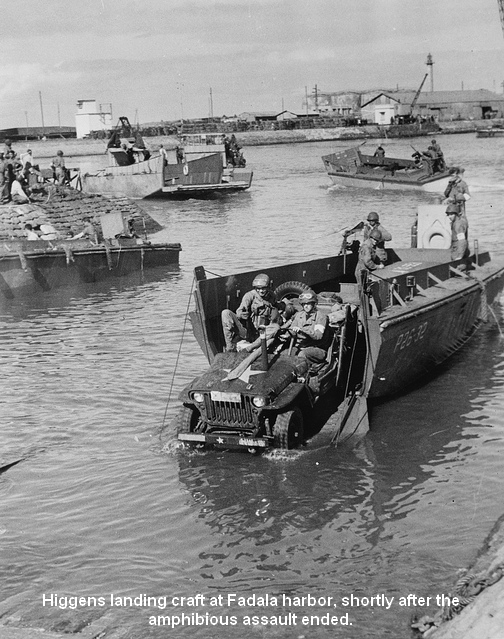 managed
to retrieve it after the Armistice on 11 November. However, crew members
manned it continuously for three days during both bombing and strafing
attacks and were awarded Silver Stars for the ordeal accomplished in wet
clothing, while living off or C rations.
managed
to retrieve it after the Armistice on 11 November. However, crew members
manned it continuously for three days during both bombing and strafing
attacks and were awarded Silver Stars for the ordeal accomplished in wet
clothing, while living off or C rations.
One of the problems with the landing was that critically
needed equipment for the infantry “cannon companies” and light artillery
batteries, like the self-propelled 105s, was not able to be taken off of the
transports soon enough to give support to the infantry elements. Included in
this critical equipment shortage were the men and equipment of the Signal
units. Worse, when equipment was finally brought ashore, it often ended up
in the wrong place or in a place where the enemy was able to capture it. One
unit found its two supply and equipment trailers 6 miles up the beach in
enemy territory. They had been stripped of everything but the ammunition.
Since ammunition was in short supply and needed, two men were left to guard
the trailers until they could be towed back. While they were guarding the
trailers a first group of nine, followed by a second group of sixteen, enemy
bombers came over the beach, dropping bombs that bracketed the trailers and
the men guarding them. One of the men was buried
in the sand but dug eventually out alive. The other was dead. To the AAA’s
credit, 105mm guns fired at the bombers and while they were really too high
for effective fire one bomber was destroyed.
By
10 November Fedala was under control and the 3rd Division was on its way to
Casablanca. Considering the chaos and carnage, Captain Henry Singer could
rightfully be pleased with the work his men did, and proud of the EM that
earned the Soldier's Medal.][1]

 Candidate
Henry Singer, Army Signal OCS Class 06-1942
Candidate
Henry Singer, Army Signal OCS Class 06-1942
Additional eMail comments received
at ArmySignalOCS.com
5-11-2012
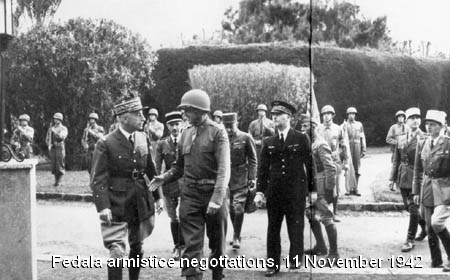 "The story is, after Churchill met with de Gaulle in Morocco he contracted
pneumonia. His doctors decided to send him to a convalescent hotel up in the
mountains at Marrakesh. There were no facilities there to provide overseas
radio to London. My dad and a detachment were air lifted to Marrakesh with
their equipment and set up a relay station allowing the Prime Minister to
remain in contact with the War Office in Britain.
"The story is, after Churchill met with de Gaulle in Morocco he contracted
pneumonia. His doctors decided to send him to a convalescent hotel up in the
mountains at Marrakesh. There were no facilities there to provide overseas
radio to London. My dad and a detachment were air lifted to Marrakesh with
their equipment and set up a relay station allowing the Prime Minister to
remain in contact with the War Office in Britain.
"Attached are copies of his orders as well as the authorization for air
travel. As these are done from 70 year old "flimsies", I hope you can read
them. The picture is of my dad in a jeep overseeing the loading of equipment
into what appears to be a British marked C-47. Finally, you will see the
commendation from Colonel Doctor, forwarded to my father, indicating the
success of the mission and the degree of satisfaction expressed by
Churchill’s personal secretary. The commendation was never mentioned in all
the time I was growing up. Although I did hear him speak of a party for all
the officers which was held at the hotel, where Mrs. Churchill played the
piano and his daughter performed several songs. Apparently, [my dad] just
saw it as another job to be done.
"There is a commendation from a British Naval Commander regarding my dads'
signal unit on Corsica, code named, "Miller". He was very proud of his
command but always credited the hard work of the NCOs and enlisted men.
"Finally, I have attached a team picture of the 'We Do'd Its.' This is the
Corsican softball tournament winning team which featured my dad as pitcher.
He is in the bottom row, second from the right. I'm afraid this may not be
usable as it was scanned from a copy of a newspaper photo and has suffered
from moiré effect."
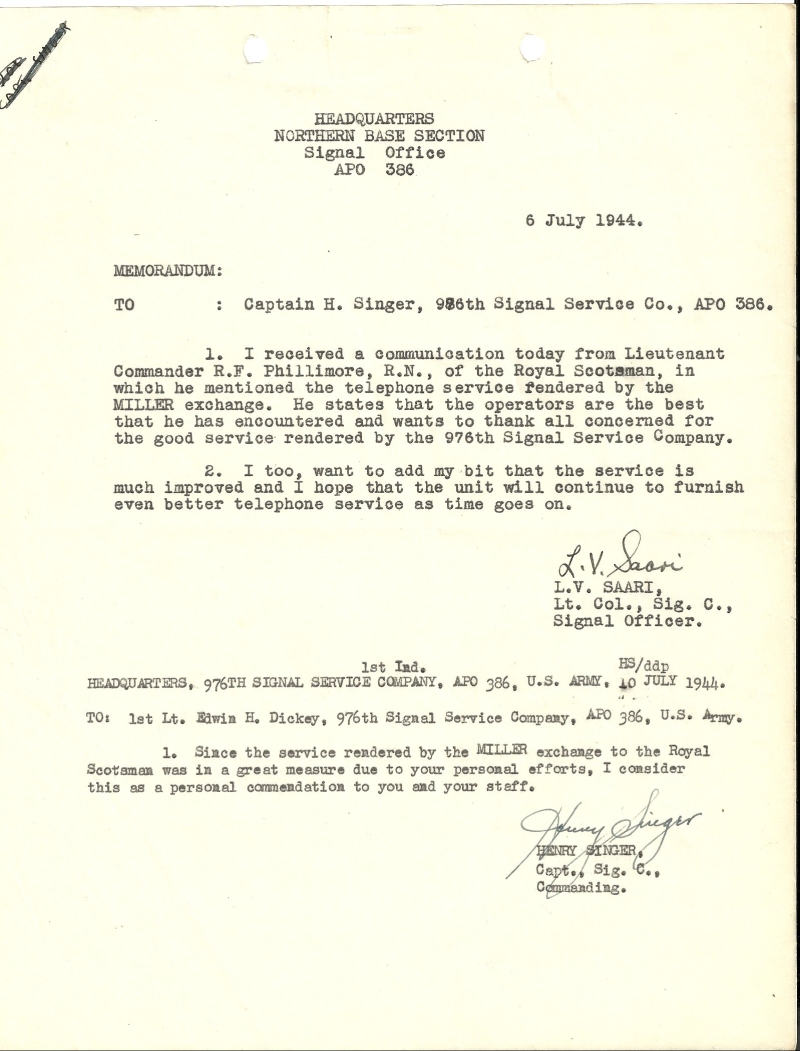

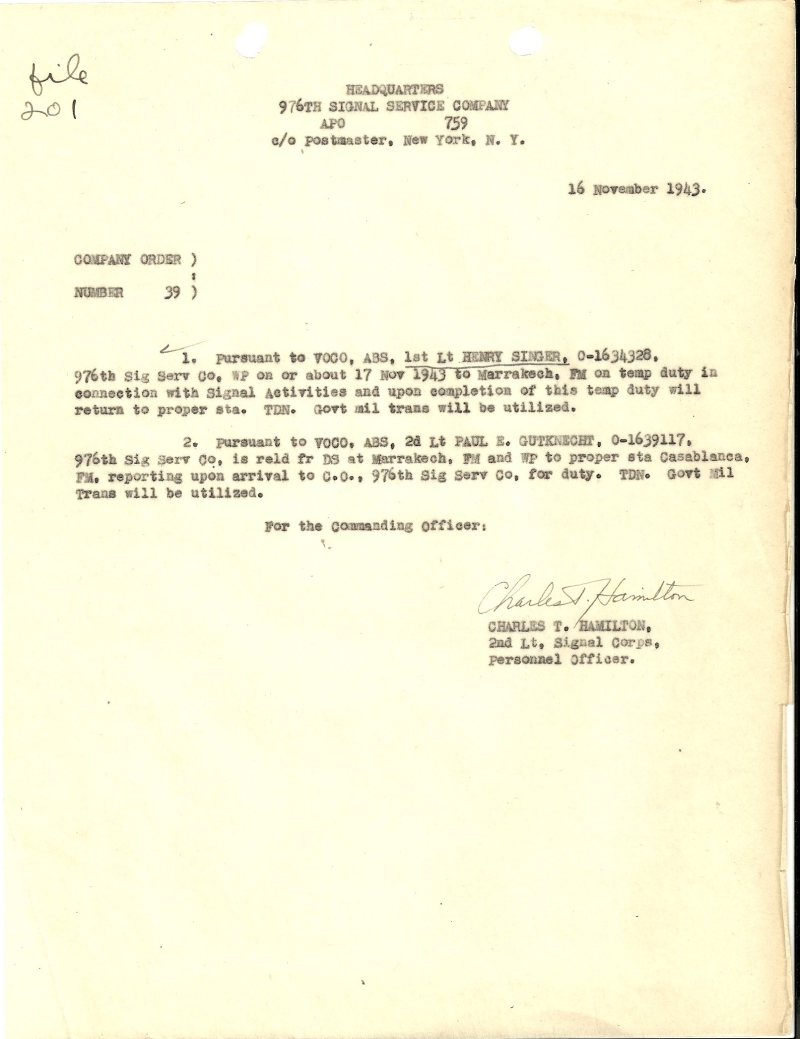
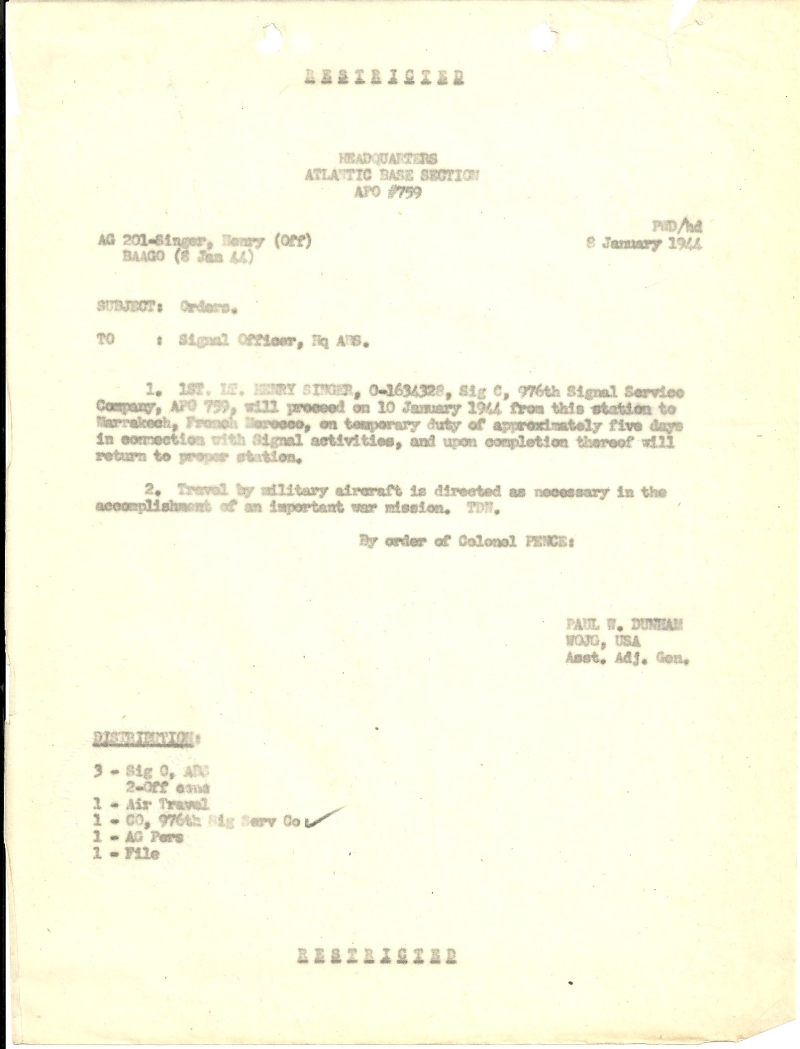

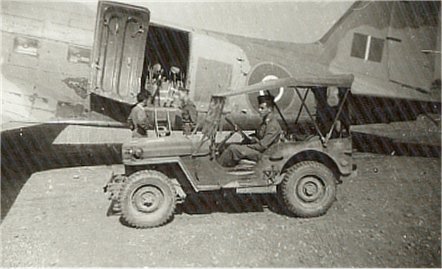
Lt. Singer loading for Marrakech
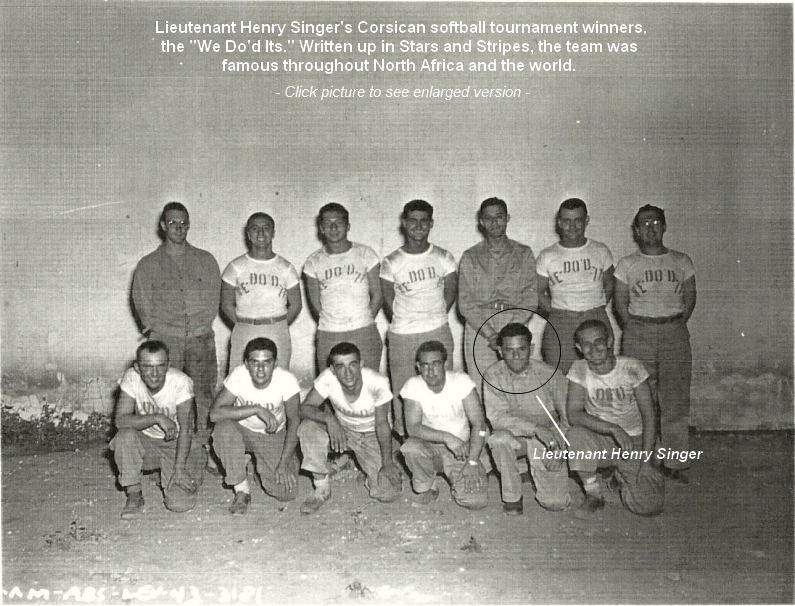
 Candidate
Henry Singer, Army Signal OCS Class 06-1942
Candidate
Henry Singer, Army Signal OCS Class 06-1942
Additional eMail comments received
at ArmySignalOCS.com
5-20-2012
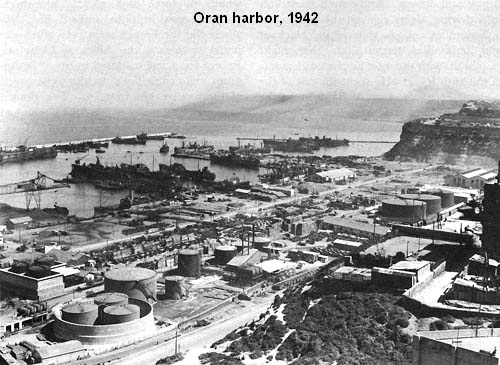 As
told to me: Once my dad and his men were detached from the 30th Infantry
Regiment they were assigned to travel to Oran [Arabic:
وهران, Wahrān,
a major city on the northwestern Mediterranean coast of Algeria,
and presently the second largest city of the
country
]
and pick up a number of company vehicles belonging to the 71st. Signal
Company. At this point in the campaign the allies had only secured the
coast. The Luftwaffe was still bombing from bases in the interior. The Navy
was reluctant to have its ships tie up at the docks in Oran for any length
of time. Cargo was being unloaded as rapidly as possible without much regard
to organization. When my dad and
his men arrived they found vehicles scattered everywhere. Trucks, jeeps,
vans and all manner of transport were jammed together just the way they were
left by the dock workers.
As
told to me: Once my dad and his men were detached from the 30th Infantry
Regiment they were assigned to travel to Oran [Arabic:
وهران, Wahrān,
a major city on the northwestern Mediterranean coast of Algeria,
and presently the second largest city of the
country
]
and pick up a number of company vehicles belonging to the 71st. Signal
Company. At this point in the campaign the allies had only secured the
coast. The Luftwaffe was still bombing from bases in the interior. The Navy
was reluctant to have its ships tie up at the docks in Oran for any length
of time. Cargo was being unloaded as rapidly as possible without much regard
to organization. When my dad and
his men arrived they found vehicles scattered everywhere. Trucks, jeeps,
vans and all manner of transport were jammed together just the way they were
left by the dock workers.
It was obvious it could
take days to find the correct vehicles for the 71st. Somehow (he never
explained this part) dad and the boys managed to get hold of a stencil set
and some paint. Well, they painted over the bumper markings and re-stenciled
them as belonging to the 71st. Signal Company! Some frustrated motor
sergeant may have gone to his grave trying to straighten out the mess at the
end of the war. But, that was my dad. Give him a job and he was going to get
it done and if the Army didn't like his methods, well, too bad. I also think
it's why the American Army was able to do what so many others couldn't.
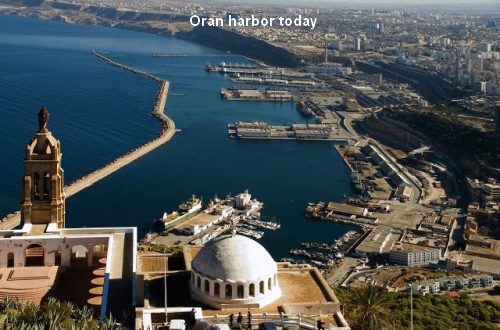 In
an aside. Dad also said the French were really pissed off at the Americans
because they were hiring Arab dock workers as stevedores and paying them 50
cents a day. Apparently that was double what they got from the French. And
then there's the story about the British officer who drove my dad’s jeep off
the end of the dock. Perhaps another day.
In
an aside. Dad also said the French were really pissed off at the Americans
because they were hiring Arab dock workers as stevedores and paying them 50
cents a day. Apparently that was double what they got from the French. And
then there's the story about the British officer who drove my dad’s jeep off
the end of the dock. Perhaps another day.
Oh, and I should tell you, they were more worried about
the Army Air Corps than the Germans. I guess they all looked the same from
5,000 feet and many of the U.S. pilots didn't want to come down low enough
to make a positive identification.
 Candidate
Henry Singer, Army Signal OCS Class 06-1942
Candidate
Henry Singer, Army Signal OCS Class 06-1942
eMail received from son David on June 8, 2012
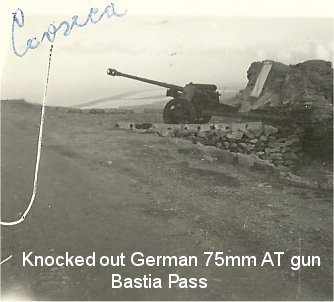 I
went through dad's photo album and tried to pick out a few things that would
be recognizable to an interested party.
I
went through dad's photo album and tried to pick out a few things that would
be recognizable to an interested party.
Photos of the camp area show what it looked like when
they got there and after camp had been set up. There's a story about the
mess hall and how it got upgraded. Corsica is a very rocky island without
much in the way of resources. After the company had been bivouacked through
an exceptionally rainy period everyone was sick of slogging through camp in
the mud. The First Sergeant came to my dad and asked if the men could build
a new mess hall. Dad knew building materials were almost impossible to
obtain. He told the First Sergeant, "go ahead but, I don't want to know
where the supplies came from."
A mess hall was constructed with a concrete floor and a
corrugated metal roof. As he told me this story dad opined that it was so
well built it was probably still in use by a Corsican olive farmer. Another
Corsica story as told to me: The 976th SSC was specifically told not to take
any poles with them as they would be able to cut down trees. This all has to
do with something called a "rhombic antennae" of which I am totally ignorant
other than dad said it had to be 90 feet high! There is nothing remotely
resembling a tall tree on rocky windswept Corsica. 1st. Lt. Singer ordered
the stevedores to lash the poles to the deck of the freighter. Upon
approaching Corsica they dumped the poles into the sea where they were able
to retrieve them from a local beach. I guess it's just another example of
how dad did things.
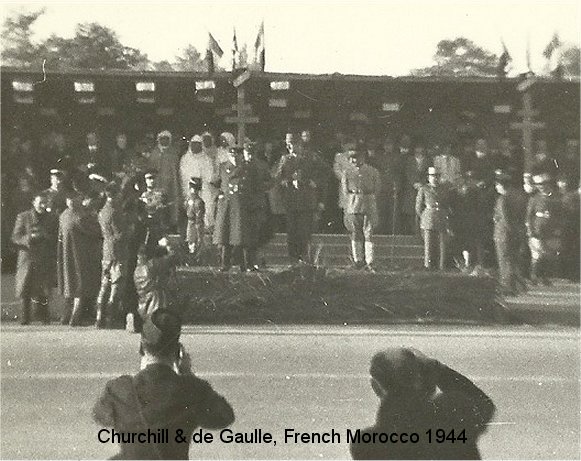
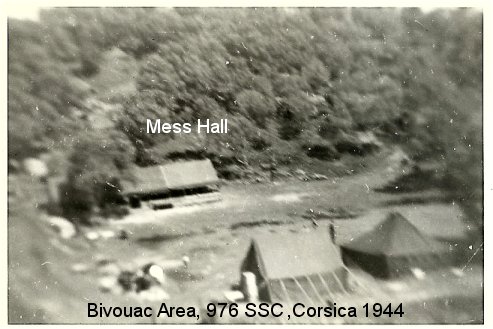
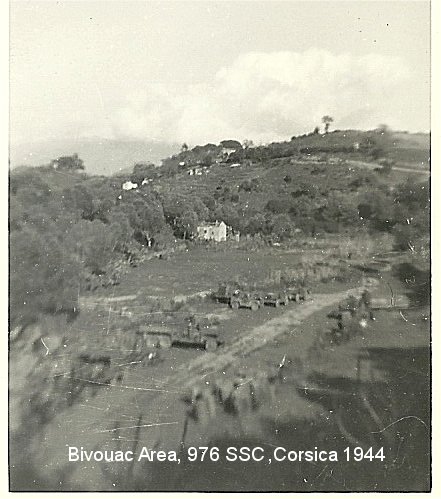
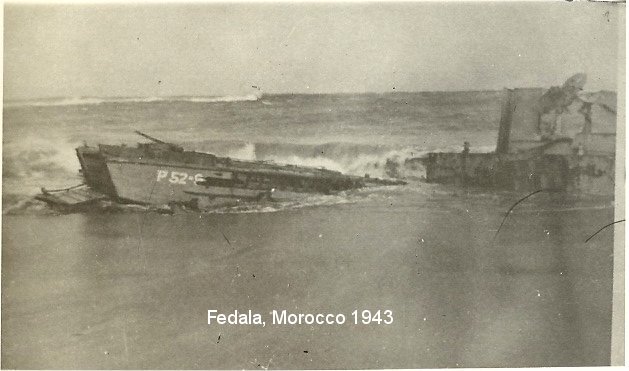



Footnotes:
[1] Source for details of Fedala amphibious assault landing: Texas Military
Forces Museum, the French Moroccan Campaign,
443rd AAA Association.
To return to your place in the text above, click here
 .
.

